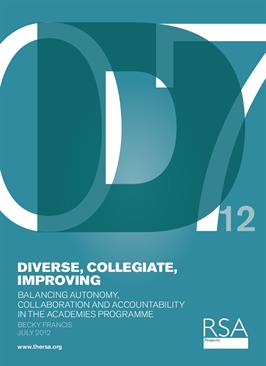Diversification of state schooling, and freeing schools from local authority control, represent core principles underpinning flagship Coalition education policies. This paper from July 2012 considers some of the key benefits and risks in the academies programme. It also outlines the model being developed by the RSA in a ‘family’ of academies that draws on best practice in embedding the benefits while mitigating the risks.
School autonomy is one of the key appeals of the academies programme. However, a number of factors, such as the development of sponsors taking over more than one school (chains), indicate a loss of autonomy for schools. This is especially the case for ‘takeover’ schools forced down the ‘sponsor route’ to academisation. There is evidence that socially advantaged pupils are over-represented in schools rated Outstanding and Good by Ofsted, while socially disadvantaged young people are disproportionately represented in those schools rated Satisfactory or Notice to Improve; that is, schools facing pressure to move to academisation.
There is also concern that the autonomy of converter academies bear two risks: a) the risk to existing quality, given the potential for complacency and b) the risk of individualistic, self-interested behaviour on the part of successful schools to the detriment of others in the locality.
School-to-school engagement, partnership and information sharing is beneficial for school improvement. However, current education policy has failed to put in place adequate mechanisms to secure system-wide improvement: there are initiatives, but these look patchy.
RSA Academies attempts to maximise the potential of the academies programme, whilst recognising and limiting the potential risks. It is an ‘umbrella trust’ that is governed through a partnership between the schools and the RSA. Our model seeks to mitigate some of the risks of autonomy while harnessing the innovation it brings.
RSA Academies includes both converters and sponsor schools. Its aim is to develop a mutually supportive family of schools that use innovative practice to improve outcomes for all children, especially those in areas of disadvantage. By balancing autonomy and accountability, it seeks to harness the creativity and professionalism that freedom brings, while maintaining responsibility for outcomes, in the interests of young people.
pdf 675.8 KB
Contributors


Join the discussion
Comments
Please login to post a comment or reply
Don't have an account? Click here to register.
I think this is great!!! I live in Argentine and due goverment corruption i see a lot of people living the dependence of the sponsor or Stokholm syndrome at all leveles of education, even more in private universities! I will apply for an sda award to bring creative solutions to tackle the problems we are living in. Thank you for your existence and understanding of our situation. We need more organizations and people like you! Florencia Segura, Marketing Degree, Master in CSR UAH from Spain, Director of AgendaRSE.